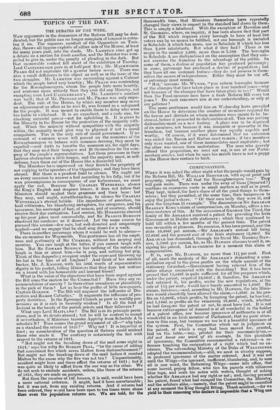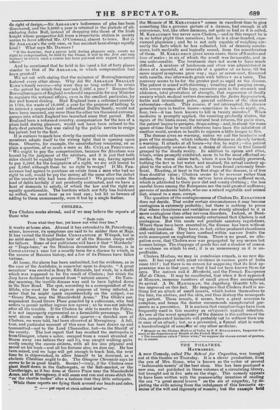COMPENSATIONS.
WHEN it.was asked the other night what the people would gain by the Reform Bill, Mr. WILLIAM BROUGHAM, with equal point and propriety, replied, " All that the Boroughmongers lose." They will gain more. There was under the sway of these [departed ?] worthies an enormous waste in small matters as well as in great. They kept, indeed, the lion's share Of all the good things to them- selves ; but they permitted, at the same time, their hangers-on to enjoy the jackal's share. " Of their own body they were ill, and gave the kingdom ill example." The discussion on Sir ABRAHAM BRADLEY KING'S claim of compensation, on Monday, offers a cu- rious instance of this. At the accession of GEORGE the Third, the family of Sir ABRAHAM received a patent fOr providing the Irish Government in Dublin with stationery; which they continued to hold till within a few months of the present time. The patent was revocable at pleasure. Its exercise, it has been proved; cost the state 10,0001. per annum,—Sir ABRAHAM'S annual bill being 22,000/. and the present cost of the Irish stationery 12,0001. Sir ABRAHAM has demanded, through his friend Mr. GEORGE DAw- SON, 2,500/. per annum, for, as Mr. DAWSON chooses to call it, re- signing his patent. Let us examine for a moment this claim of compensation. It is, says Mr. DAWSON, no more than 111 per cent. First of all, mark the modesty of Sir ABRAHAM'S demanding a com- pen-sation equal to the gross profits on the whole amount of the stationery furnished,—Government having relieved him of the entire charge connected with the furnisruno.!. But it has been proved that 12,0001. is quite sufficient for all purposes which, under the patent, required 22,0001.; if, therefore, Sir ABRAHAM had retained it, his profits, under the new regulations, at the rate of 111 per cent., would have barely amounted to 1,400/. He claims, however,—and, according to Mr. DAWSON, the late Minis- ters would cheerfully have allowed the claim,-1,4001. as his pro- fits on 12,0001., which profits, by foregoing the patent, he has lost; and 1,100/. as profits on the remaining 10,000/., which, whether he had foregone the patent or not, he must have lost. It is not because extravagance of demand is at all wonderful in the holder of a patent office, nor because ignorance -of arithmetic is at all wonderful in an Irish member of Parliament, that we point atten- tion to this case, but because we see in it a beautiful specimen of the system. First, the Committee which sat in judgment on the patent, of which a copy had been moved for, granted, laid on the table,—nay, printed for their accommodation,— did nut know one word of its contents. In this plenitude of ignorance, the Committee recommended a reference—a re- ference touching the resignation of a right which had no ex- istence. The retrenching Ministry of the Duke of WELLINGTON adopted the recommendation,—still, we must in charity suppose, in profound ignorance of the matter referred. And it was not until the Whigs—the ignorant, inefficient, blundering, and, to sum all in one word, the Reforming Whigs—came into office, that some horrid, prying fellow, who ties his parcels with villanous blue tape, and seals his notes with wafers, thought of asking whether Sir ABRAHAM had any right or not ; and, having perused his patent, found what had escaped the Committee, the bMinistry, and the arbiters alike,—namely, that the patent might be cancelled at any moment the King thought fitting. Thank accident,—for we yield to their reasoning who declare it impossible that a Whig can
do right of design,—Sir ABRAHAM'S hollowness of plea liasiseen
• discovered; an&the-2;500k a year is retained in the pockets of all- -enduring John- Bullsinstead of dropping into those of the Irish 'knight whose prospective fall from a respectable station in society 'seems to have affected Mr. O'CONNELL almost to tears. But is Sir ABRAHAM'S the only case, or has accident been always equally kind ? What says Mr. DAWSON ? " If the doctrine, that a patent held during pleasure only, create no right to compensation, be held by the House, it will be the first and only instance in which such a course has been pursued with regard to patent offices."
And he mentioned that he held in his hand a list of forty places similar to that of Sir ABRAHAM, in which compensation had been granted! We set out with stating that the nuisance of Boroughmongery fostered every other abuse. Why did Sir ABRAHAM BRADLEY KING'S family receive—why were they so long suffered to retain —the patent for which they now'asls 2,5001. a year ? Because the Boroughmongers of England rendered it impossible for any Minister to regulate the national affairs, even in the smallest particular,..by fair and honest dealing.. Had England been a reformed country in 1760, the waste of 10,0001. a year for the purpose of bribing to its interest a respectable and influential Dublin family, would not have been incurred, any more than the other ten thousand extrava- gances into which England has launched since that period. Had England been a reformed country, compensation for the loss of a place held during pleasure, would not have been refused to the forty-first patentee that was called by the public service to resign his patent, but to the first.
It is curious to mark how slowly the mental vision of honourable members adapts itself to the strong light that is opening upon them. Observe, for example, the unsatisfactory reasoning, on so plain a question, of so acute a man as Mr. CUTLAR FERGUSSON. "We ought to pay the compensation, because Sir Abraham was bound by the judgment of the arbiters, and it is just that both sides should be equally bound !" That is to say, having agreed to pay 2,5001. for the resignation of a right, we are still bound to pay 2,5001. although there be no right to resign ! If Mr. FER- GUSSON had agreed to purchase an estate from a man who had no right to sell, would he pay the money all the same after the defect of the vendor's title had been discovered ? We groan under the load of debts lawfully if not prudently contracted, and we have a host of demands to satisfy, of which the law and the right are equally questionable. The burdens which our folly has burdened us withal, we must bear as we best can ; but let us beware of adding to them unnecessarily, were it but by a single feather.



























 Previous page
Previous page